Emma and I moved from Boston to Berlin almost exactly 4 months ago, and there have been a lot of huge changes. We’re far away from family and friends, I’ve started a software development job, Emma’s just finished the second draft of her book, we’re both working on learning a new language … it can be a bit overwhelming when we think about it all.
That’s not what I’m going to talk about in this post, though. In this post, I want to talk about the strange minutia that we’re already starting to take for granted, the little things that make us pause and go, “Huh. I guess that’s not what I’m used to?”
I will preface this by saying that it’s very possible the things I’ve noticed in Germany are also extant in the US, and I just haven’t seen them. These are just the differences that have struck me.
Ready? Okay, let’s jump right into the mundanity.
Breakfast Foods

I’m what is colloquially known as a “bagel-boy.” (Full disclosure, no one has ever called me that and I just made up the term.) That’s because bagels are my favorite breakfast food. A nice, chewy poppy seed bagel with cream cheese and some slices of cucumber or avocado? Sign me up.
Although we’ve found many good bakeries and baked goods in Berlin, I’ve seen very few good-looking bagels. I picked up a 4-pack of what claimed to be bagels from a grocery store but, based on their taste, I think they were actually just rolls with holes in them (so, not pre-boiled and not chewy at all). We’ve found some good bagels at local cafes like Shakespeare and Sons, but it’s not easy to buy them in bulk, pre-slice them, and freeze them for whenever it’s breakfast time.
So, I’ve been making a fair amount of overnight oatmeal. I highly recommend it if you haven’t tried it: I tend to mix oats, milk, some raw sugar, chia seeds, dried cranberries, and cinnamon in a bowl, cover it, and leave it overnight.
On a whim the other week, I picked up an unfamiliar fruit from the grocery store, which I described as a mix of cranberries, pomegranates, and grapes. They were fairly tart, but excellent with sweet, creamy oatmeal.
I soon learned that “Johannisbeeren” are actually red currants, which I had only ever had dried. They’re not my new favorite fruit or anything, but they’re quite tasty, and an excellent addition to my breakfast repertoire.
Plastic Hangers with Swiveling Hooks
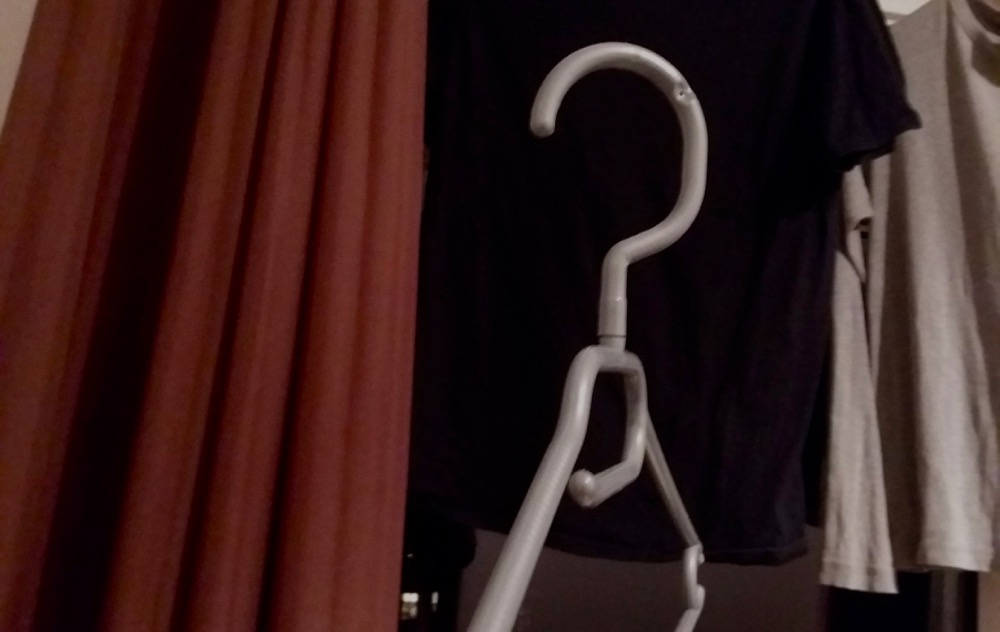
While I’m used to seeing the plastic clothes hangers with metal hooks that swivel, a lamentable deficiency in my preferred hanger type, the chunky plastic ones, is the lack of a swiveling hook. You can only put them on the rack from one side, and with little leniency in terms of angle.
Of course, I had never considered this lack of functionality before; it was just the way hangers worked. There were flimsy plastic ones with swiveling metal hooks, chunky plastic ones with unidirectional hooks, and wire hangers. It wasn’t until I SAW these ones that I even considered that hangers COULD come in different varieties.
I would not be surprised if hangers like this are very easy to come by in the US, but I hadn’t run into them in all my time there, so they were new, novel, and convenient for me.
Mundane enough for you so far? No? Then let’s dive right into …
Things You See on the Beach
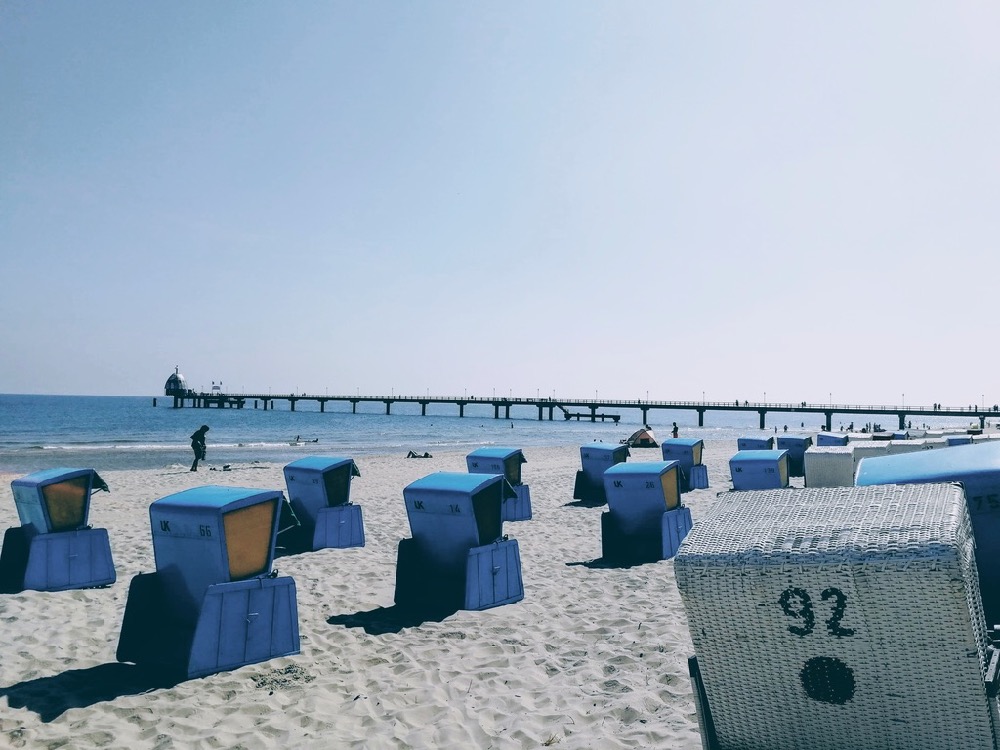
In my relatively rare beachside outings in the States, I was used to seeing people sit with three things:
- Towels (to prevent sullying their butts with sand)
- Folding beach chairs (ditto)
- Beach umbrellas (to keep out of the direct, hot sun)
In our delightful trip to Greifswald and Usedom on the Baltic Sea, here are the common beach accessories I witnessed:
- Towels (phew, at least some things haven’t changed)
- Rentable wicker beach benches (as seen in the picture above; they have railings in front of them that you need a key to unlock) Edit from Emma: I learned in German class that they’re called Strandkörbe!
- Tents (like, full tents that you’d go camping with??)
The rentable benches make a fair amount of sense. It seems like beachside hotels rent then out, or even include them with bookings. And, sure, it seems pretty nice to have a padded, shaded bench to sit on while at the beach.
It’s the tents that are really baffling. Tents are a hassle to set up, and the wind will blow sand into them and you’ll never be able to get it out, and the sand will then get all over the trunk of your car … and for what? To be able to not sit on the sand, not be in the sun, and not see the ocean? I’m a little skeptical.
Trash and Recycling

In Boston, we fought for the ability to recycle anything, and we often lost. Apartment buildings with more than a few units can’t participate in Boston’s curb-side trash and recycling pick-up. Instead they have to contract private waste and recycling companies to take care of it. These companies usually don’t do both trash and recycling, which means the property management needs to pay separately for each service. And, in our experience, at least, that usually means they just don’t pay for recycling. It was quite inconvenient considering we would walk past Boston’s nice, zero-sort, curb-side recycling bins every other week without being able to participate.
So, you can imagine what a pleasant change it was too be greeted with this sign on the door to our dumpster enclosure at our initial four-month rental apartment. No, it’s not zero-sort, but it’s really refreshing to not have to fight for the ability to dispose of recyclables responsibly. There are even separate dumpsters for compost, a service we would have had to pay for in Boston unless we had yard space to do it ourselves.
Photo Booths
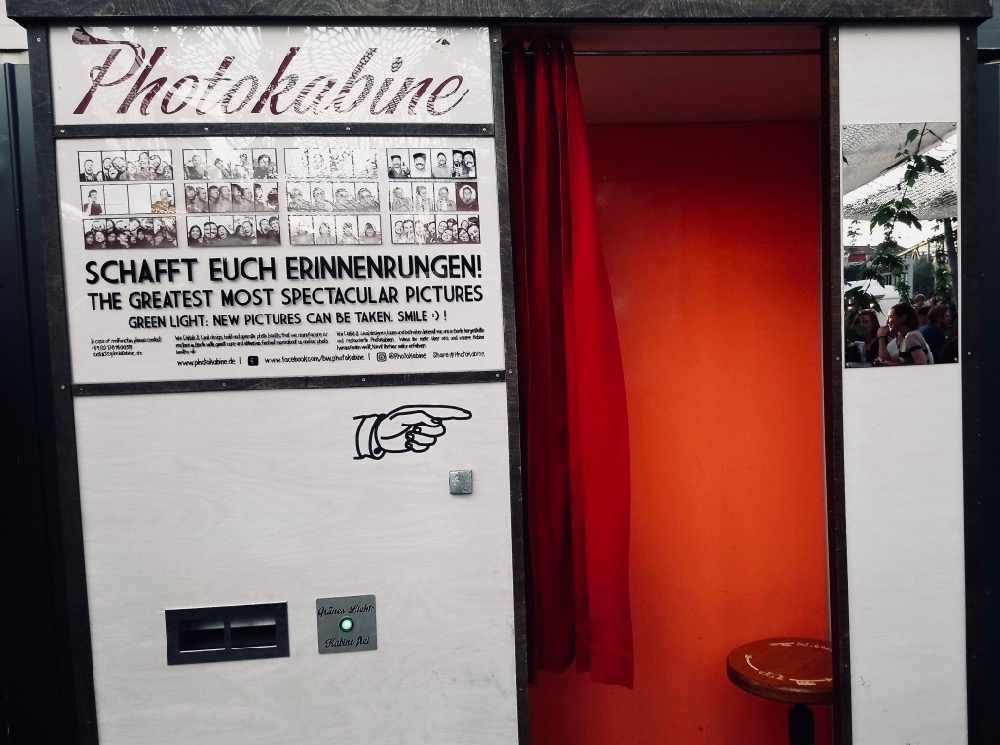
I don’t remember the last time I saw a photo booth in the US – maybe twenty years ago in a mall in Tennessee? I may be forgetting other times, but they’re certainly not common in the Boston. Photo booths, however, are a regular sight in Berlin. Many tourist attractions, some train stations, and a good number of commercial areas have fairly nice phone booths displayed fairly prominently. And because they’re so common, people use them! Or, because people use them, they’re so common …
A particularly nice thing about some of these photo booths is that they will provide you with biometric photos that are appropriate for official documents, like passports. Our social insurance cards and Emma’s residence permit have photos on them that we took in one such booth in this mall.
The Wurst Section
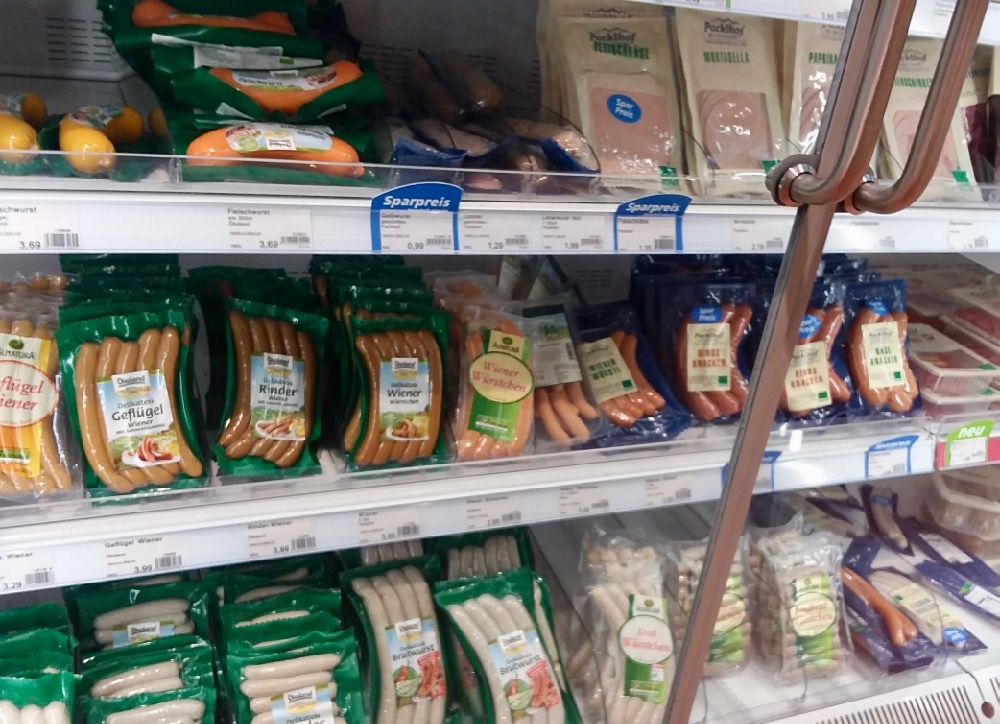
There’s a lot of sausage to be had here. I’m used to having perhaps five or six different sausage options (sauptions), taking up shelf or two in the refrigerated section at a grocery store. Here, sausage usually has its own refrigeration unit; sometimes two.
I will admit that I’ve yet to be able to recognize the different types of sausages … they all seem to be pork and they all seem to be around the same color – a pallid, fleshy tone not dissimilar to my own skin tone. In my own sausage buying excursions, two of the main criteria I would use to decide on my purchase were animal of origin and color, and those options don’t seem to exist here. Chicken sausages, my preferred type? Quite rare. I’ve seen them just once in these four months.
Vegan sausages, however, are the one type of non-pork sausage that is quite easy to come by. Like the multitude of vegan restaurants in Berlin, it’s not hard for a non-meat-eater to get their hands on some protein-rich edible cylinders.
I’m sure there are very good reasons for all of these things but, so far, they just haven’t been our priority to research and learn about. But, I hope we keep noticing things like this. We’re lucky to have the things we take for granted challenged.
If Berlin were a great bagel city, I might not have tried red currants. If we were still surrounded by American hot dogs (which was not literally the case in Boston, but bear with me), we might not be discovering new, tasty meats. Without seeing efficient waste management, we might think that Boston’s sub-par system is as good as it gets.
My point is simply that it’s easy to get stuck in your own ways and forget that there are other ways of doing things. Maybe the other ways are better, and if that’s the case, how lucky you are for knowing about them now! And even if the other ways aren’t better from your perspective, it really makes you appreciate how good the bagels you had were.
What are some of the mundane things you’ve noticed when moving or traveling to a new place?






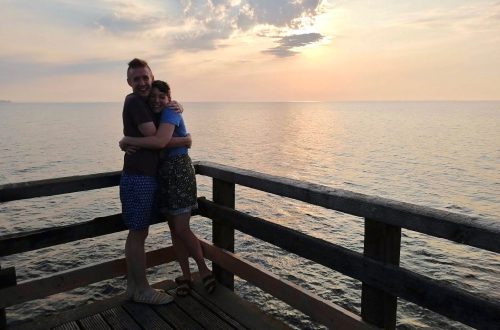
2 Comments
Karen
Do you forget the photo booth in the lobby of good ole MOS? 🙂
RJ
Great post, bagel-boy! Moving from one English-speaking country to another, most of the minutiae I noticed was linguistic. I recently realized that I have fully converted to saying “zed” over “zee”. I have a Canadian friend who says “pro-cess”, “pro-ject”, and “pro-gress”, which is fine, but also pronounces produce as “pra-duce”, which I find much more jarring! Recycling is definitely much easier in Canada (or at least in Vancouver), but I never think about it as much as I do when I’m back in the states and irritably searching for a public recycling bin. Other small things only stuck out to me after I’d been away from the US for a while and then went back: the perception that Americans talk really loud is uh, true! And gosh do we uniquely love expressing our opinions via bumper stickers. I’m curious to hear about more mundane differences you two have noticed, and to see if more become clear to you when you visit the states again!